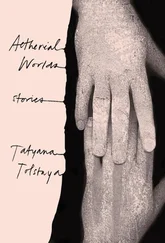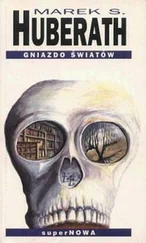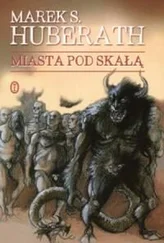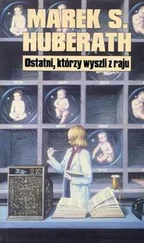One of the copters wavered, veered, lost control, as if the hand guiding it had weakened. The craft dipped, careened, and fell among the buildings on 5665 Avenue. Crashing into one of the apartment buildings, it exploded with the force of the several tons of bombs and missiles that it carried. Fire from the fireball rained down on the division in the street. One of the blades of the copter, Gavein saw, described a blazing arc in the air and hit the back rotor of a neighboring copter, breaking its axle. The second copter, losing stability, dropped and disappeared among the houses. It too crashed, and the fragments flying from that second explosion struck the next copter, which caught fire but quickly rose, trailing black smoke, to reach a region of enough time retardation that it could wait for assistance. Though in flame, the third copter grew darker.
Gavein couldn’t help laughing—one weak hand had eliminated half the squadron. In the distance he saw tanks and armored carriers on fire. He heard the cannonade of shells detonating from the heat. He saw soldiers reeling in flame. He pitied them, though they had come to kill him. It was Thompson who had sent them to their death. But the thought that Sergeant Kurys and his men might be among those soldiers put an end to Gavein’s pity.
“The effect,” he said. “It works, it works, Little Manul!”
She didn’t answer.
“We are in no danger. You can see for yourself.” He turned to Lorraine. “Let’s go back home,” he said. “The fear is over.” But Lorraine was now more in dread of him, he guessed, than she was of all those soldiers and their machines of war.
The surviving copters flew off, but the burning street was in chaos. Rescue operations began. The division on 5665 Avenue to the west remained in place. On the avenue to the east, various military vehicles blazed. The only copter still present was the one burning overhead in retarded time. Gavein looked down 5454 Street: the troops, standing at a distance, showed no inclination to advance.
Ra Mahleiné shouted that the telephone was clattering. He went to pick it up, judging that at the moment his umbrella of safety wasn’t necessary for the two women.
“You’ve won, Throzz,” Medved said. “They accept your terms.”
“The other squadrons, why aren’t they attacking?”
“There are no other squadrons.” Medved’s voice quivered with amusement. “Someone accidentally started a fire, it made its way to the gas tanks, and twenty-four copters packed with bombs were blown sky-high. Thompson’s entire fleet. Davabel’s entire air force, practically. Three machines are left, half of the first squadron that you polished off. Are you satisfied?”
“You’re laughing, Medved?”
“From the first, I told them this would happen.”
“And Thompson, how is he taking it?”
“Thompson doesn’t concern me. He’s under arrest now. Behind bars, on the president’s order. I looked into those murders. It was Thompson’s commandos all right. They acted on his orders, given without the knowledge, let alone consent, of the other members of the commission. The old jackass really had it in for you.”
He stopped, expecting some remark from Gavein. When Gavein said nothing, he added:
“The only problem is that that division, the one with the commandos, went into action today, and I don’t know if those men will live.”
“Medved. We have three hours till sundown. In that time your men must get here. They must take away the bodies, straighten the house, repaint the walls, scrub the floors, bring new furniture—and food. My wife is too weak to sleep on the street, so all this must be done before nightfall. That’s what I want from Davabel. In addition, you will make public, on television, the whole truth about the Commission of Defense and Thompson’s plan, and about the bombing of the Division of Science. Tomorrow we will receive medicine for Ra Mahleiné. Dr. Nott must make a house call. And no more tricks.”
“I’m not an idiot, Throzz. There will be no tricks. I’ve been observing this phenomenon from the beginning, and now I no longer have over me a horse’s ass with a title and medals. The investigation is in the hands of the head prosecutor of Davabel.”
“I’d like to believe that,” Gavein said under his breath, able to imagine all sorts of scenarios in which the past would be repeated.
“There’s another problem,” he said to Medved. “One of the residents, a woman, survived Thompson’s hatchet men. Her name is Lorraine Patricks. She’ll stay with us, to take care of Ra Mahleiné and also because those who step away from me tend to die. I’d like to save her. Make her a sleeping place on the first floor with a separate TV set, so she doesn’t get too much in the way. Make us an apartment in the front room.”
“Consider it done, Throzz. That’s all? I’ve already sent people. There will be two trucks with furniture and equipment. They’ll cross the cordon at 5665 Avenue, from the west. White trucks.”
“Good. I’ll wait for them.” Gavein put down the phone. He had to trust in the sanity of those who ruled Davabel.
It wasn’t long before the two promised trucks arrived. They pulled up in front of the building. First, the usual police work was done. Flashes of the cameras came through the window. Then the bodies, five of them wrapped in plastic, were removed on stretchers and placed on carts. The cleanup crews went into action: some took out furniture, some put in new windowpanes, some washed floors. Wallpaper was torn off and walls spray-painted. Gavein counted at least twenty workers. Because the paint needed an hour to dry, they took a break. Some smoked. All wore masks.
One of the crew approached Gavein and the women. Glittering eyes showed through the slits of his black mask.
“You are David Death?” the man asked.
“Yes?” Gavein stood to shield his wife.
“No, I just… I wanted to look you in the face.”
Medved’s team was quick and efficient. Once the walls were dry, new wallpaper was put up, and the window frames were painted.
“We’ll sleep in a new apartment,” Gavein said.
“They better hurry,” said Ra Mahleiné, “or I’ll pee all over your book.”
For an hour she had been sitting on Nest of Worlds . They had both decided that the safest place for it was under the cushion of her wheelchair.
The workers now carried in the new furniture. When they were done, one of the men came up to Gavein and saluted.
“Lieutenant Adams. I have a letter for you from Colonel Medved.” He handed him a sealed envelope.
Gavein opened it with a finger and took out a page folded in four and covered with a tight, hardly legible handwriting.
Dear Mr. Throzz:
I chose this private form of communication to avoid the delay that attends the processing of messages delivered through the official channels of our organizational mill. Most of the information in this letter is not confidential, but please do not send a reply. That will spare me bureaucratic consequences that are most tiresome.
You must have met Dr. Omar Ezzir, a physicist at the DS, though it is possible you do not remember him.
The man could get to the point, thought Gavein.
Ezzir died in the earthquake, but earlier, at one of our meetings, he put forth the idea that no one but you is in a position to solve the mystery of this epidemic of deaths.
I do not recall his arguments—possibly I did not follow them that carefully, or it may have been only conjecture on his part. Ezzir was a man who went by intuition, and by that time our ears were open to any hunch.
My request to you, in any case, is that you devote yourself entirely to figuring out the phenomenon that is yourself. Perhaps you will discover what is causing the tragedies of Davabel.
Читать дальше












